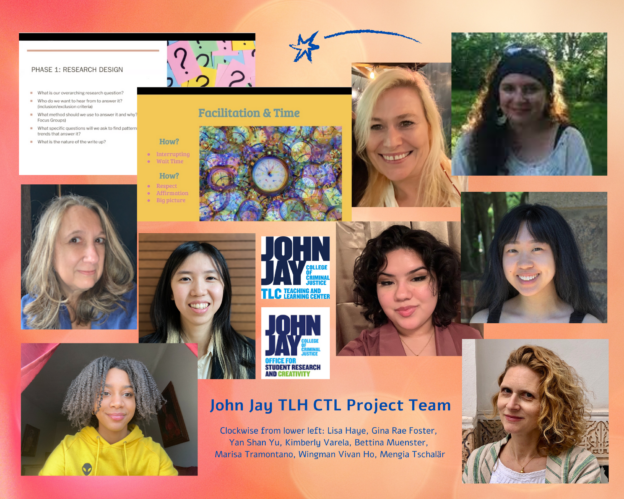We reenact archetypal stories so frequently that we may miss their significance and our own roles when we are caught up in the action. At John Jay, our TLH Center for Teaching & Learning (CTL) project has become one of these archetypes which represents a journey undertaken by one character who then encounters a new friend with additional resources and skills. As a pair, these two continue to meet and befriend others to create a powerful community capable of meeting unexpected challenges and creating extraordinary possibilities. In our student-centered TLH project, we build on the expertise and combined knowledge of John Jay students and faculty alike. After the initial call for proposals sent to Gina Rae Foster, Director at CUNY’s Centers for Teaching & Learning, a mutual acquaintance recommended connecting with Bettina Muenster, the Assistant Director of our Office for Student Research and Creativity. She brought on board 2 undergraduate students (Lisa Haye, Economics, B.S. 2024, and Kimberly Varela, Criminal Justice, B.S 2023), 2 graduate students (Yan Shan Yu, Forensic Psychology, M.A. 2024, and Wingman “Vivian” Ho, Forensic Psychology, M.A. 2024) interested in participating as focus group leaders and faculty mentees. Further conversations brought in Mengia Tschalär, TLH Faculty Fellow and Adjunct Associate Professor of Anthropology, and Marisa Tramontano, one of our new lecturers in Sociology. Our team covers multiple disciplines and represent a variety of nationalities and generations. Together we are a lively, determined, and passionate cohort and our journey has been one of serendipity and camaraderie! We are traveling towards a quantitative and qualitative analysis of student focus group responses to questions about their learning experiences in courses taught by funded faculty seminar participants that were offered by the TLC from 2016-2021. Through this analysis, we plan to amplify our assessment of our faculty seminar impact through gathering feedback from students experiencing these innovative pedagogy-supported learning experiences. We anticipate that the analysis will demonstrate whether or not students find positive learning experiences in these courses with these instructors and that the analysis will also identify areas in which students believe they could be taught more effectively and differently.
Our TLH funded project builds on previous assessment of these faculty seminar participants, who were surveyed through a Qualtrics partnership in Spring 2021. This survey asked seminar alumni to recall their learning experiences and to share what concepts and practices they were implementing from their seminars into their teaching. When we conducted the survey, we also asked respondents to identify their levels of confidence in their own teaching and to name the types of resources and peer connections they were using to deepen their teaching and their understanding of their students. At this point in our journey, May 1, we are happy to share that we have accomplished multiple collaborative tasks. We have been active in co-designing and engaging in trainings, the codevelopment of student focus group materials, and the deepening and strengthening of our intrepid community. Yan Shan Yu and Gina Rae Foster have co-written and submitted an IRB protocol to authorize our use of student information related to the focus groups. As part of our IRB submission, Kimberly Varela, Vivian Ho, and Lisa Haye created screening materials for students interested in participating in the focus groups. We have created the focus group questions with intensive discussion between the students on our team and our expert faculty.
As we have learned from Mengia Tschalär and Marisa Tramontano, who shared their materials and lessons from student qualitative research collaborations, we have developed resources that we believe others can use to discuss learning with students and support students who are leading these conversations. Our Assistant Director of the Office for Student Research and Creativity, Bettina Muenster, has been instrumental in inspiring, guiding, and moving us through these processes. We are proudest of our student focus group and facilitation trainings, which we would like to present and share with others doing similar work across CUNY. Our faculty mentors, Marisa Tramontano (Sociology) and Mengia Tschalär (Anthropology) co-designed a training that provides context and practice for working with focus groups, which we connected with a workshop in facilitation roles and skills with our Teaching & Learning Center Director Gina Rae Foster. It was exciting to combine training in effective communication with preparation to collect and analyze qualitative data and doing this work with students strengthened and enriched all of our understanding. Looking forward, we are eager to begin recruiting students and working with the focus groups. We anticipate intense conversations over the summer as we create codes and annotate transcripts of the student conversations. Once this is done, we will begin analyzing our findings and preparing to write, present, and share what students believe they are gaining from learning with Humanities faculty who have engaged in innovative pedagogies through formal faculty development. Even more importantly, we are eager to discover what and how students want to learn that they are not currently experiencing in these courses.
-Gina Rae Foster, Bettina Muenster, Mengia Tschalär, Marisa Tramontano, Yan Shan Yu, Vivian Ho, Lisa Haye, and Kimberly Varela


